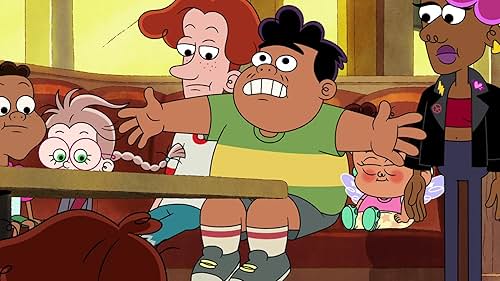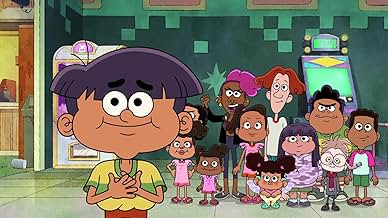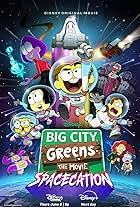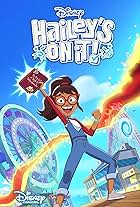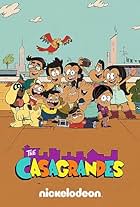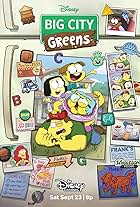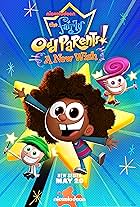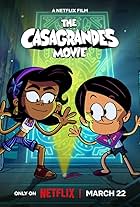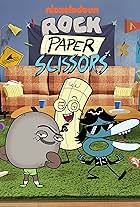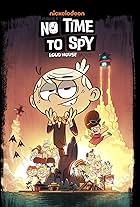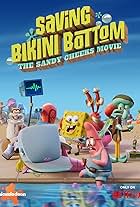Tater, a quirky girl with ambitious dreams for her future and only one summer to sort them out, finds her plans disrupted when her mom unexpectedly invites all 12 of her cousins to visit.Tater, a quirky girl with ambitious dreams for her future and only one summer to sort them out, finds her plans disrupted when her mom unexpectedly invites all 12 of her cousins to visit.Tater, a quirky girl with ambitious dreams for her future and only one summer to sort them out, finds her plans disrupted when her mom unexpectedly invites all 12 of her cousins to visit.
Browse episodes
Storyline
Featured review
Normally, I don't usually criticize a series without finishing it or based only on the first episodes, but given the noise that the trailer generated throughout Latin America and now with the first two episodes available on YouTube, this occasion warrants it.
The series Primos was wrongly promoted as the series that intended to represent all of Latin America. The error is very evident, since the series only focuses on a sector of Los Angeles located between the border that separates Mexico from the United States. This error is due to the fact that in the United States, Mexico is considered the only sector of Latin America without taking into account the other countries. To be clear, most of the Latin American countries that are not Mexico and their inhabitants are mostly unknown to the United States' vision of Latin America. So the series only focuses on a family whose members are of Mexican origin, since Mexicans are the only thing that the United States has the most knowledge of.
The shocking thing was how the main family is made up of many members living in a house that is not in good condition. That is usually the most common and superficial view that American common sense has of Latin America. Realistically, one has to admit that Latin America is an underdeveloped territory that suffers from a lot of poverty. The bad thing about that image is that it overshadows the few positive aspects that exist in the different Latin American cultures. The most coherent thing about this series is that it works more like a parody of families living in the suburbs following a formula similar to that of Bordertown. From that perspective, one can consider that the series works as a parody. In artistic terms, it does not have bad animation, some characters have decent designs and it has good humor. Luckily, they corrected some things like the name of the territory where the series takes place and the name of Lucita. Characters like Tater's mother and grandmother use a mix of English and Spanish, but it would have been more fascinating if the mother had moments where she speaks English and Spanish at other times. The grandmother should have had all the dialogues in Spanish to make her more fascinating. Having made the series bilingual would have contributed a lot.
Natasha Kline wanted to make a series about her own childhood and touch on the subject of multiculturalism. Although the latter is something that needs to be addressed, at least she did achieve the goal of making a reflection of her childhood. Each episode deals with family conflicts and concludes with Tater learning the value of family. It is not something new, but the series achieves that goal. It is very common for large families to have fights and end in reconciliation. It is something that happens every day and is always repeated. In the end, it is not such a bad series and it turns out to be funny.
If at the beginning it had been said that this was going to be a parody and not a representation of all Latin America, people would have been more understanding. The scandal could have been avoided if they had even said from the beginning that the "Hey, Cousins" was done on purpose or if Myrna Velasco had not said anything scandalous at all.
The conclusion that can be drawn for now is that Primos is a series that is better seen as a parody, because in that it manages to work quite well and be somewhat enjoyable. It is a series that has good intentions, but it was damaged by the bad press it received. The rating I give this series is 7/10 and this rating will only be temporary until the series ends.
The series Primos was wrongly promoted as the series that intended to represent all of Latin America. The error is very evident, since the series only focuses on a sector of Los Angeles located between the border that separates Mexico from the United States. This error is due to the fact that in the United States, Mexico is considered the only sector of Latin America without taking into account the other countries. To be clear, most of the Latin American countries that are not Mexico and their inhabitants are mostly unknown to the United States' vision of Latin America. So the series only focuses on a family whose members are of Mexican origin, since Mexicans are the only thing that the United States has the most knowledge of.
The shocking thing was how the main family is made up of many members living in a house that is not in good condition. That is usually the most common and superficial view that American common sense has of Latin America. Realistically, one has to admit that Latin America is an underdeveloped territory that suffers from a lot of poverty. The bad thing about that image is that it overshadows the few positive aspects that exist in the different Latin American cultures. The most coherent thing about this series is that it works more like a parody of families living in the suburbs following a formula similar to that of Bordertown. From that perspective, one can consider that the series works as a parody. In artistic terms, it does not have bad animation, some characters have decent designs and it has good humor. Luckily, they corrected some things like the name of the territory where the series takes place and the name of Lucita. Characters like Tater's mother and grandmother use a mix of English and Spanish, but it would have been more fascinating if the mother had moments where she speaks English and Spanish at other times. The grandmother should have had all the dialogues in Spanish to make her more fascinating. Having made the series bilingual would have contributed a lot.
Natasha Kline wanted to make a series about her own childhood and touch on the subject of multiculturalism. Although the latter is something that needs to be addressed, at least she did achieve the goal of making a reflection of her childhood. Each episode deals with family conflicts and concludes with Tater learning the value of family. It is not something new, but the series achieves that goal. It is very common for large families to have fights and end in reconciliation. It is something that happens every day and is always repeated. In the end, it is not such a bad series and it turns out to be funny.
If at the beginning it had been said that this was going to be a parody and not a representation of all Latin America, people would have been more understanding. The scandal could have been avoided if they had even said from the beginning that the "Hey, Cousins" was done on purpose or if Myrna Velasco had not said anything scandalous at all.
The conclusion that can be drawn for now is that Primos is a series that is better seen as a parody, because in that it manages to work quite well and be somewhat enjoyable. It is a series that has good intentions, but it was damaged by the bad press it received. The rating I give this series is 7/10 and this rating will only be temporary until the series ends.
- Elvis-Del-Valle
- Jul 31, 2024
- Permalink
- How many seasons does Primos have?Powered by Alexa
Details
- Runtime22 minutes
- Color
- Sound mix
- Aspect ratio
- 1080i (HDTV)
- 16:9 HD
Contribute to this page
Suggest an edit or add missing content




